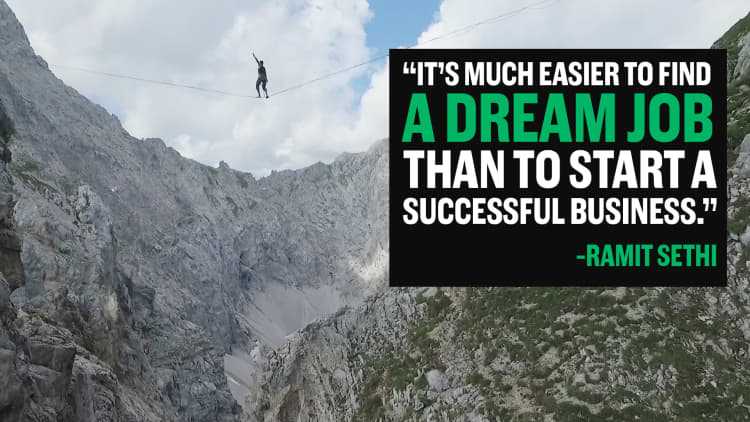Do you think it's bad to quit? A lot of people do. But they're wrong.
We've been told quitting is bad since we were children. As entrepreneurs, we admire bold CEOs who refuse to quit. And it's fun sharing moments we start something shiny and new.
I admire the greats as much as anyone else: Jeff Bezos, Warren Buffett, Elon Musk and all the giants who stood by their vision to change the world.
But it's rare we talk about those moments where something isn't working — a product, a relationship or an entire business — and the entrepreneur has to make the hard decision to kill his or her darling.
We need to look out for those critical moments where the best decision is quitting and moving on to something more promising. In fact, knowing when to fold may be even more important.
Here are 5 signs it may be time to quit:
1. WHEN THERE'S NO FUTURE
For every David vs. Goliath story, there are hundreds of ideas and start-ups that failed against the bigger company. Kiko is one.
In 2005, Kiko was a web calendar start-up that wanted to combine Microsoft Outlook with Google's new email application, Gmail. It was a great idea ... until Google unveiled Google Calendar a month later.
Kiko was outgunned. It didn't have the resources to compete against the search giant. So it was quietly sold and the founders pivoted to a new idea. Years later that evolved into Twitch, a $970 million company.
2. WHEN TRUSTED ADVISORS AGREE
A few years back, I thought I had a great idea for a new product. I spent three months developing the idea myself, including creating a marketing plan and revenue goals.
Then I decided to get a second opinion.
I turned the plans over to our product team. They told me they'd evaluate the plan and come back with a recommendation.
After a month, they delivered a report, and it was damning. It showed me, in plain math, that this product would never work. It would be a huge, multimillion-dollar mistake to even begin developing the product. Thankfully, they recommended that I make the right decision and abandon the futile task before we had ever begun.
You don't need a formal product or analytics team, by the way. Your trusted advisors can be a few close friends or mentors. Listen to them!

3. WHEN YOUR PRIORITIES SHIFT
In 2008, Howard Schultz famously returned to lead Starbucks. He wanted to focus on the coffee chain's core values and de-emphasize growth.
Obviously Schultz didn't "quit" the coffee business. But he did clean house: He fired many of his top executives and shut down dozens of stores so he could maintain his focus on those core values. In the years after his return, Starbucks grew into a $85 billion company.
4. WHEN YOU REALIZE YOU'RE SQUANDERING YOUR UNIQUE ABILITIES
For awhile, my friend Tim Ferriss' main source of income was start-up investing. He did well, but he found that investing was cutting into his other love: writing. So he quit.
In a thoughtful post, he explained that any worthy start-up would eventually find an investor. But if he stopped writing, "I'm squandering the biggest opportunity I have to have a lasting impact on the greatest number of people."
5. WHEN THE PROJECT HAS BECOME A DISTRACTION
Last year, we decided to close a $2.6 million program. Most companies would kill for that kind of revenue. It would be tempting to milk it for four or five more years.
But when we looked at our business, we knew this program was distracting us from even larger opportunities that loomed ahead. So to keep focused, we decided the best strategy was shutting it down, regardless of the short-term revenue cost.
Too often quitting gets a bad rap. People think quitting means failure, but I think it takes a certain courage to quit.
Your greatest growth is ahead of you. It's not always easy to make the decision to quit, but you owe it to yourself to make the tough call.
Want more tips on quitting bad habits — and creating good ones — so you can make more money, grow your business, and virtually guarantee success? Check out our Ultimate Guide on Habits.
Ramit Sethi is a New York Times bestselling author and CEO of GrowthLab.com, where entrepreneurs go to launch and grow their online businesses. He recently quit sleeping on his stomach.
More from Ramit Sethi:



